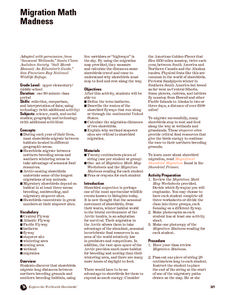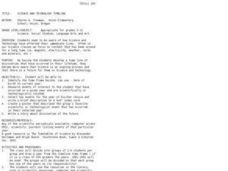NOAA
Ocean Layers I
How is it possible for ocean water to have layers? The sixth installment of a 23-part NOAA Enrichment in Marine sciences and Oceanography (NEMO) program investigates factors that cause different water densities to occur. Experiments...
Chicago Botanic Garden
Climate Change Impacts on Ecosystem Services
The fourth activity in a series of five has classes participate in a jigsaw to learn about global impacts of climate change and then share their new information with a home group. Groups then research impacts of climate change (droughts,...
NOAA
Technology I
Isn't technology great? The 12th installment of a 23-part NOAA Enrichment in Marine sciences and Oceanography (NEMO) program introduces technology that marine scientists use. Pupils take part in an activity using conductivity,...
NOAA
Vertebrates II
Mammals of the ocean unite! Or not. The 20th installment of a 23-part NOAA Enrichment in Marine sciences and Oceanography (NEMO) program investigates how warm-blooded marine mammals survive in water. In the class activity, learners use...
Curated OER
Indianapolis 500 Unit-Science
Fourth graders access prior knowledge of simple machines to build a car. In this car design lesson, 4th graders create and race their cars. Students evaluate what was good and bad about their designs. Each car will incorporate a simple...
PBS
Stories of Painkiller Addiction: Myth or Fact
Are opioids the most abused drug after marijuana? How hard is it for young people to obtain painkillers without a prescription? Middle and high schoolers explore the growing epidemic of opioid addiction with a lesson that prompts them to...
National Park Service
Leave it to Beavers
Many people know cats mark their territories by rubbing the back of their necks to leave a scent, but not many people know beavers also leave a scent to mark their territories. During the first activity of two, scholars use their noses...
Curated OER
Endangered Marine Turtles
Students work in groups and experience what it is like to be a hatchling marine turtle by playing a board game. In this endangered marine turtles lesson, students research the threats to marine turtle hatchlings. Students then create a...
Safe Drinking Water Foundation
Making a Difference
After learning about the effects of water pollution, your class will discuss ways to make people in their community aware of the importance of water conservation. Then, your young environmentalists will write a letter to the local...
Redefining Progress
Have and Have-Not
Is there a correlation between a country's wealth and the extent of its ecological footprint? What exactly constitutes an ecological footprint, and how does one country stack up against the rest? This is a unique lesson to incorporate...
Chicago Botanic Garden
Personal Choices and the Planet
The last activity in the series of four has individuals determine steps they can take to reduce their carbon footprints and then analyze their schools' recycling programs. Through a sustainability audit, they identify how and where their...
Chicago Botanic Garden
Personal Choices and the Planet
How big is your footprint? Activity three culminates the series by having groups complete carbon footprint audits with people in their schools and/or around the districts. Groups then gather their data, create a presentation including...
Curated OER
Exploring the Sky: Reading Maria's Comet
Discover the science behind astronomy. After reading the book Maria's Comet, which is about a young woman who breaks new ground by becoming a female astronomer, young learners practice reading comprehension with worksheet questions about...
Prince William Network
Migration Math Madness
A great way to incorporate math into life science, this lesson has learners measure migratory routes on a map and calculate the actual distance that shorebirds on the routes would cover. Learners compute the distance covered in both...
Chicago Botanic Garden
Calculating Your Ecological Footprint
You can lower your ecological footprint by recycling! Lesson four in this series of five has individuals, through the use of a computer, calculate their ecological footprints. Through discussions and analysis they determine how many...
Channel Islands Film
Island Rotation: Lesson Plan 2
Why are Torrey pines only found in La Jolla, California and on Santa Rosa Island? Class members examine images of Torrey pines from these two locations, noting the similarities and differences, and then develop a demonstration model that...
Chicago Botanic Garden
Calculating Your Carbon Footprint
Unplugging from technology for one day per week will decrease your carbon footprint—are you up to the challenge? Part two in a series of three allows individuals to explore their personal carbon footprints. By first taking a quiz at home...
Lincoln Public Schools
Cell Exploration Activities
Engage young biologists in exploring the mysteries of life with this collection of hands-on activities. Enlisting the help of numerous digital resources, students get an up-close look at the structure of plant and animal cells as they...
Curated OER
Filling in the Picture
Learners study archaeological sites. They discover some of the problems inherent in choosing sites and what parts are chosen for excavation. They evaluate and explain their choices for study and articulate the process of archaeological...
Curated OER
Plants and Animals, Partners in Pollination
Students participate in multiple hands-on activities to explore reproduction and pollination. In groups, using a cotton swab and powder, students simulate being pollinators and plants. They name the parts of the flowers and the function...
Curated OER
"ART ZOO 'Blacks in the Westward Movement', 'What Can You Do with a Portrait', and 'Of Beetles, Worms, and Leaves of Grass'"
Students study black history, examine portraits and portrait making and create their own portraits, and investigate their natural environment. This humanities activity provides a text that can be used to teach lessons in black history,...
Curated OER
Science and Technology Timeline
Students develop a time line of discoveries that have occurred in their lifetime. In this time line lesson plan, students research scientifically or technologically related events of interest to them, write a brief description on a 4x6"...
Curated OER
The Science of Ghana
Students explore the climate and food sources of Ghana. In this lesson plan on climate students view diagrams of global convection and complete a convection experiment.
Curated OER
Natural Disasters: An Adventure in Non-Fiction
Students study different natural disasters. In this natural disaster lesson students read a nonfiction book followed by a discussion, an experiment, then collect illustrations from their experience.

























